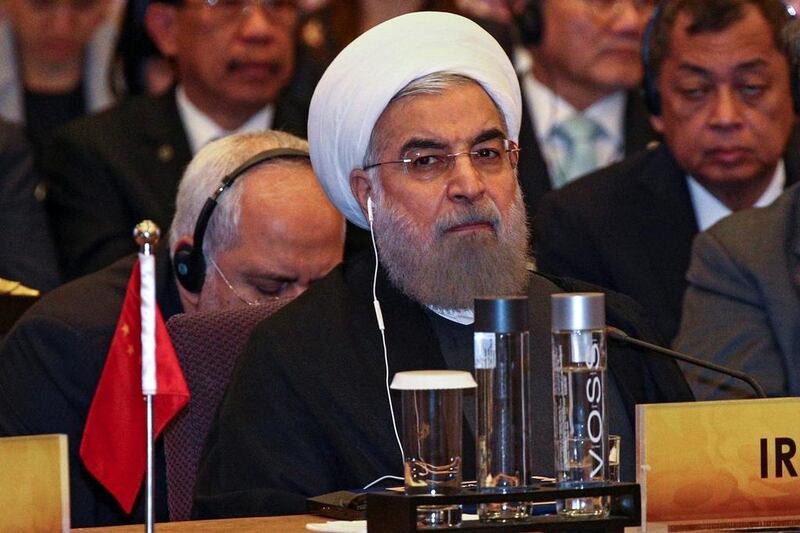ABI DHABI // Iranian President Hassan Rouhani begins a one-day visit to Oman and Kuwait on Wednesday in a bid to lower tensions between the regional rivals as Tehran braces for increased pressure from the new US administration.
Mr Rouhani was scheduled to first meet Sultan Qaboos in Muscat before travelling to Kuwait at the invitation of the emir, Sheikh Sabah Al Ahmad Al Sabah, Iranian state media reported.
Last month, the Kuwaiti foreign minister, Sheikh Sabah Khaled Al Sabah, made a rare visit to Iran, where he delivered a conciliatory message from the GCC. “Gulf states have a true desire that relations with Iran are normal and based on international law,” Sheikh Sabah said during his visit, calling for a “normalisation of ties and opening dialogue”.
The GCC had agreed to a basis for talks with Iran at the annual summit in December, including ending interference in the internal affairs of Arab states and Tehran’s support for militant groups.
The Iranian president’s trip is the latest step in this tentative process of engagement between the GCC and Iran after the cold war between Saudi Arabia and Iran reached new heights last year.
Mr Rouhani stated his desire for normal ties with the GCC during his inauguration in 2013, and Iran’s minister Mohammed Jawad Zarif had called for a dialogue over the past year.
But anger in the GCC over Iran increasingly projecting its power across the region and the previous US administration’s intentions towards Iran after the nuclear deal gave way to a cycle of escalation.
Gulf countries cut or reduced diplomatic ties with Tehran, and Iran boosted efforts against Gulf rivals, increasing support for militants in Bahrain as well as allies among rebels fighting the Saudi-led coalition in Yemen.
But Donald Trump has vowed to renegotiate the Iran nuclear deal and has appointed senior national security officials critical of Iran. His administration has declared that it is putting Iran “on notice” and is reportedly in talks to provide more military support to the Saudi-led coalition, which is supporting the internationally-backed government against the Iran-backed Houthi rebels.
The US has also imposed new sanctions against Tehran for provocative ballistic missile tests carried out last month and is considering whether to designate Iran’s Islamic Revolutionary Guards Corps as a terrorist organisation.
During Barack Obama’s tenure, most GCC countries felt that the US was working towards a rapprochement with Iran and that it wanted to leave a balance of power in the region so it could focus on pursuing its interests in east Asia.
Promises to help enhance the GCC’s security and military abilities to counter Iran’s regional activities fell short, from a Gulf perspective. The Obama administration refused to share information with the Arab coalition about intercepted Iranian arms shipments to Yemeni rebels, according to one Gulf official — an example of actions that stoked concerns.
But the return to a stated US policy of containment and a much closer alignment on Iran between the White House and Riyadh, may have reassured GCC officials to feel comfortable trying to engage Tehran, even if it remains sceptical of what can be achieved.
“I think that there is more confidence particularly from the Saudi side to engage [because] they are aware that there is going to be increased pressure on Iran going forward,” said Sanam Vakil, an expert on Iran at Johns Hopkins School of Advanced International Studies. Some observers said the willingness to talk may have more to do with a desire to demonstrate that they had tried, rather than being really invested in the process.
Tehran is also hoping to take advantage of the uncertainty around what Mr Trump’s approach to the region will be, and concerns about military conflict with Iran, an outcome that could be disastrous for the GCC.
If the two sides do engage, in the immediate term it will most likely focus on issues that could nevertheless serve as confidence building measures, such as finalising the return of Iranian pilgrims to the Haj.
“It is an important trip for President Rouhani,” Ms Vakil said. “Iran has a number of fronts of tension with the US, and I think from Iran’s perspective dialling down the extent of the tensions with the GCC is an advantage.”





